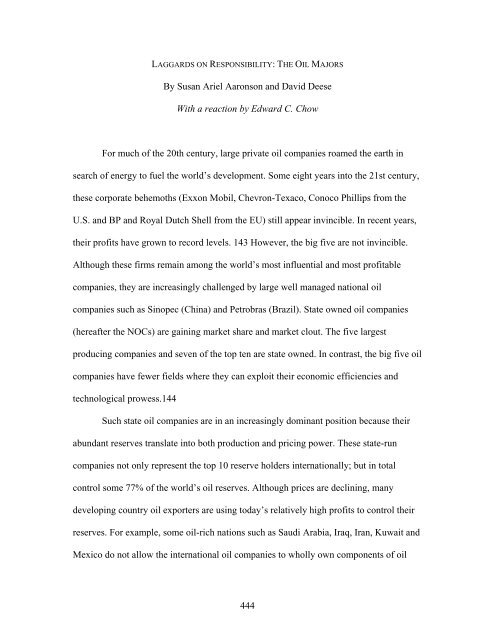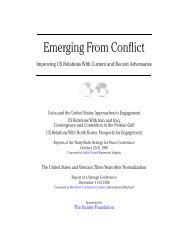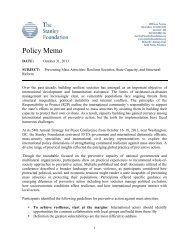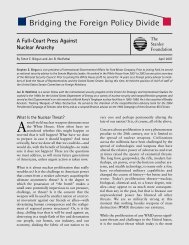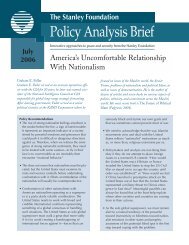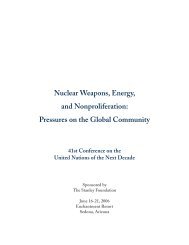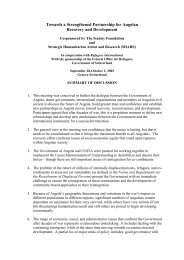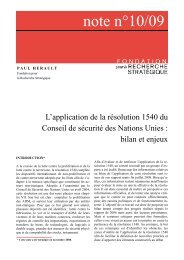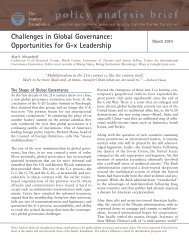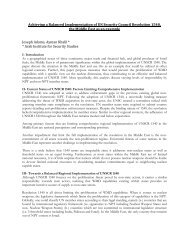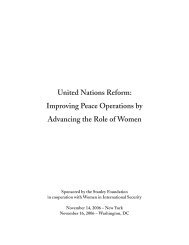444 By Susan Ariel Aaronson and David Deese With a reaction by ...
444 By Susan Ariel Aaronson and David Deese With a reaction by ...
444 By Susan Ariel Aaronson and David Deese With a reaction by ...
- No tags were found...
You also want an ePaper? Increase the reach of your titles
YUMPU automatically turns print PDFs into web optimized ePapers that Google loves.
LAGGARDS ON RESPONSIBILITY: THE OIL MAJORS<strong>By</strong> <strong>Susan</strong> <strong>Ariel</strong> <strong>Aaronson</strong> <strong>and</strong> <strong>David</strong> <strong>Deese</strong><strong>With</strong> a <strong>reaction</strong> <strong>by</strong> Edward C. ChowFor much of the 20th century, large private oil companies roamed the earth insearch of energy to fuel the world’s development. Some eight years into the 21st century,these corporate behemoths (Exxon Mobil, Chevron-Texaco, Conoco Phillips from theU.S. <strong>and</strong> BP <strong>and</strong> Royal Dutch Shell from the EU) still appear invincible. In recent years,their profits have grown to record levels. 143 However, the big five are not invincible.Although these firms remain among the world’s most influential <strong>and</strong> most profitablecompanies, they are increasingly challenged <strong>by</strong> large well managed national oilcompanies such as Sinopec (China) <strong>and</strong> Petrobras (Brazil). State owned oil companies(hereafter the NOCs) are gaining market share <strong>and</strong> market clout. The five largestproducing companies <strong>and</strong> seven of the top ten are state owned. In contrast, the big five oilcompanies have fewer fields where they can exploit their economic efficiencies <strong>and</strong>technological prowess.144Such state oil companies are in an increasingly dominant position because theirabundant reserves translate into both production <strong>and</strong> pricing power. These state-runcompanies not only represent the top 10 reserve holders internationally; but in totalcontrol some 77% of the world’s oil reserves. Although prices are declining, manydeveloping country oil exporters are using today’s relatively high profits to control theirreserves. For example, some oil-rich nations such as Saudi Arabia, Iraq, Iran, Kuwait <strong>and</strong>Mexico do not allow the international oil companies to wholly own components of oil<strong>444</strong>
fields <strong>and</strong> infrastructure. Other countries such as Venezuela <strong>and</strong> Russia are restrictingprivate sector access to their fields.Moreover, many of these state-owned enterprises neither operate strictly on thebasis of market principles. These state owned firms are guided <strong>by</strong> multiple political aswell as economic goals such as distributing wealth, maintaining energy security,achieving foreign policy aims, <strong>and</strong> creating jobs.145 Some of these NOCs are notcompletely owned <strong>by</strong> the government—<strong>and</strong> many such firms operate mainly according toprivate sector decision rules. However, many such firms do not have to maximizestakeholder value on a quarterly basis, as do the big 5. Finally, many (but not all) of thelargest state-owned oil companies are members of OPEC, the global oil cartel. Taken insum, these state-owned firms can frequently coordinate their activities <strong>and</strong> decisions tomaximize profits <strong>and</strong> prices when it serves their interests, an option not available toprivate firms under national <strong>and</strong> international competition policies.146 And many ofthese NOCs are affiliated with governments that at times ignore international norms forprotecting the environment or respecting human rights.In this essay, we discuss how the big five international oil companies approach,incorporate, <strong>and</strong> interact with global norms for responsible behavior at the very time thatthey deal with the growing challenges of the NOCs. We examine whether or not thesecompanies act as responsible stakeholders in the global economy. In particular, we focuson the areas of energy security, climate change <strong>and</strong> alternative energy, human rights, <strong>and</strong>transparency/accountability. However, we believe this topic should be h<strong>and</strong>led withcaution. Although corporations are often global market actors, international law generallyapplies to states, not to non state actors.445
Caveats on Firms as StakeholdersWe believe no company can consistently act as a responsible stakeholder becauseresponsible stakeholdership is not defined under international law. Companies are verydifferent from states, <strong>and</strong> cannot be held to the same st<strong>and</strong>ards as states. Where managershave control, (e.g. when an issue affects their operations), companies can more easilyconform to emerging international norms. But in other instances (as in climate change ornational development policy), companies have limited leverage to shape emerging norms;they can only respond to market forces. In such cases, we discuss whether they use theirinfluence appropriately or at all.Although we can’t firmly define “responsible stakeholdership” for the big 5, wecan delineate some broad parameters for such behavior. We believe that responsibleprivate oil companies would provide affordable, plentiful access to various energysources. They would also invest in alternative energies <strong>and</strong> do their best to plan for futureenergy sources when supply is limited <strong>and</strong> prices are high. In addition, these firms wouldstrive to act responsibly in countries where governance (of the environment, markets, <strong>and</strong>human rights) is inadequate. They would develop policies to ensure that they were notcomplicit with human rights abuses <strong>and</strong> would work to ensure that their activities werenot built on conflict or corruption.In general, corporations do not have specific responsibilities under internationallaw. Nonetheless, private firms do have some international responsibilities. AsGeorgetown Law Professor Carlos Manuel Vazquez has noted, corporations are artificialgroups of natural persons. Just as individuals have some responsibilities underinternational law, so do corporations acting as conglomerations of individuals.147446
seas. How should companies respond to these cross-pressures? Managers have no roadmap to balance these multiple issuesFinally, all companies juggle to meet both their shareholder obligations <strong>and</strong> theirstakeholder responsibilities. There is no one set model for responsible stakeholderpractice in the oil industry or the business community in general, (although there areoverlapping or common responsible practices required in some areas). But it isparticularly difficult for extractive industry firms.Extractive industry firms must go where the extractive resources are located. Asthe supply of energy has declined in the west, managers of these firms have increasinglysourced from countries where governance is inadequate <strong>and</strong> where corruption is endemic.Oil <strong>and</strong> gas production, like other extractive industries, is capital-intensive. Extractivefirms must make large investments long before they begin to produce oil or oil products.These firms are especially vulnerable to political, legal <strong>and</strong> social risk <strong>and</strong> in particular,corruption, given the huge sums involved.Oil <strong>and</strong> gas producers are often the largest investors in such countries <strong>and</strong>therefore may hold substantial influence over the government. Although these firms areobligated to respect host government sovereignty, these firms are under mountingpressure to use their influence to change the behavior of host governments.151 However,because of that same clout, oil <strong>and</strong> gas investors could crowd out the voice of othermarket <strong>and</strong> political actors. Yet these same oil <strong>and</strong> gas companies are increasingly undershareholder <strong>and</strong> stakeholder pressure to act in a responsible manner. Yet what isresponsible is also “unclear.”448
Energy <strong>and</strong> Security: Ensuring An Adequate <strong>and</strong> Sustainable Supply of Energy toMeet Societal NeedsAlthough energy security is a global <strong>and</strong> national public good, in generalcorporations <strong>and</strong> not governments provide the world’s people with the energy they need.While some such corporations are arms of the state, as noted above, the big five are not.The big five therefore must meet state directives while juggling stakeholder <strong>and</strong>shareholder directives. Most states are determined to achieve energy security-- a majorforeign policy challenge for all governments.152 Energy security can be defined ashaving an adequate <strong>and</strong> sustainable supply of energy to meet the needs of citizens,commercial interests <strong>and</strong> public sector functions. But energy security in any one countryis a function of global energy security.The link between energy <strong>and</strong> security is a complex calculation of the“vulnerability” of any specific individual, country, or set of countries to serious social,economic, political, or military disruption stemming from change in one or moredimensions of energy—including its price, availability, or geopolitical effects. A countrymight be only moderately dependent on any one exporter, but low levels of availablestockpiles or storage of that fuel <strong>and</strong> rigidity in the market might make that country quitevulnerable. Since oil <strong>and</strong> natural gas markets are generally international or at leastregional in nature, national <strong>and</strong> international vulnerabilities often can only be reduced <strong>by</strong>sets of governments <strong>and</strong> firms working in collaboration. Given the constant barrage ofevents that can influence market conditions, corporate <strong>and</strong> government leaders share acollective interest in effectively monitoring <strong>and</strong> managing supply.449
A wide range of public <strong>and</strong> private <strong>and</strong> national <strong>and</strong> international actorscollaborate to provide the world with energy. As they drill, these actors must also protectthe physical flow of oil or natural gas from the producing field to the consumer. Friendly<strong>and</strong> hostile governments as well as business competitors must work together. Suchcollaboration is threatened <strong>by</strong> a wide range of political <strong>and</strong> market factors including pricevolatility.The big five international oil companies sit in the middle of this quest to balanceenergy <strong>and</strong> security. They must find ways to profit between energy exporting states keento maximize prices <strong>and</strong> limit supply, <strong>and</strong> importing countries determined to maximizesupply <strong>and</strong> limit price volatility. The International Energy Agency has estimated that todevelop <strong>and</strong> deliver energy to the world’s people will require massive newinvestments.153 Current supplies are not meeting the increases in dem<strong>and</strong>. Thus,responsible stakeholders would invest heavily not only in new oil fields, but in energyefficiency <strong>and</strong> alternative energy sources as well.But the big five energy companies have generally cut spending levels in realterms over the past 10 years <strong>and</strong> reinvested in their own stock.154 Moreover, the hugemergers in the industry have not channeled the resulting lower costs toward explorationefficiencies. As a result, Baker Institute scholars Amy Myers Jaffe <strong>and</strong> Ronald Soligoconclude that these firms are unable to respond flexibly to market conditions.155 Whilebuying back stock may well be in the short-term interest of shareholders, it is not in thelong term interest of energy consumers—i.e. global stakeholders. These firms have notacted as responsible stakeholders in regards to ensuring long-term energy security.Moreover, they are not even acting responsibly towards their shareholders. According to450
Jafee, “if a company is not replacing reserves, <strong>and</strong> they are spending their case to buyback shares, that is called liquidating the company.”156And <strong>by</strong> their failure to invest early <strong>and</strong> sufficiently, the world’s people remainvulnerable to damaging price spikes, higher long term prices, <strong>and</strong> possible supplydisruptions from natural disasters, political upheaval, <strong>and</strong>/or terrorism. Many of the worldlargest suppliers—with the prominent exceptions of the United States, Canada, Britain,<strong>and</strong> Norway—have significant political instability <strong>and</strong> or policy uncertainty. As outlinedin Table 1 below, almost 70 percent of U.S. imported oil comes from Saudi Arabia,Venezuela, Nigeria, Algeria, Angola, Iraq <strong>and</strong> Russia.157 Each of these countries has alow ranking in terms of democratic political institutions <strong>and</strong> a high risk of political,economic, <strong>and</strong> policy instability. The U.S. provides a good example of the repercussionsof continued reliance on such states for oil <strong>and</strong> gas supplies. From 2002 to 2007, in fact,the U.S. has become increasingly reliant on oil from fragile (relatively unstable) statessuch as Nigeria, Iraq, <strong>and</strong> Angola. The single largest absolute increase in exports to theUS over this period was from Nigeria, which is among the very least stable <strong>and</strong>transparent states in the world.INSERT TABLE 1 CHAPTER 11 HEREThe table examines America’s leading sources of petroleum, their politicalstability <strong>and</strong> their commitment to democratic accountable governance. (All of thesesuppliers except Canada are relatively unstable, <strong>and</strong> all except Canada <strong>and</strong> Mexico) ranklow on scales of democracy <strong>and</strong> good governance.)451
As energy companies, both private <strong>and</strong> state-owned, pursue energy security <strong>by</strong>drilling for oil in developing countries, they have poured their investments into countriesthat are also extremely vulnerable to political risk. For example, among 177 states in2008 Sudan ranked number 2 on the failed state index, Chad ranked 4, DemocraticRepublic of Congo 6, Kyrgyzstan 39, <strong>and</strong> Timor-Leste 25.158Many of these new energy suppliers have not effectively utilized the associatedrevenues to improve public welfare, diversify their economy, or develop sustainabledemocratic systems. While not all such countries are failed states, they are “fragile states”which are not well governed.159 Many of these states suffer from the “resource curse:they are not able to use their abundant resources to achieve both sustainable development<strong>and</strong> equitable economic growth. When firms decide whether to invest in these countries,they must weigh the world’s growing thirst for oil with concern that governments willmisuse oil rents.160Climate ChangeOil <strong>and</strong> gas firms bear much of the responsibility for the world’s environmentalproblems. The big five are not only are huge polluters, but are huge energy investors.They could use their profits to invest in both energy efficiency <strong>and</strong> alternative energysources such as batteries <strong>and</strong> wind power. Moreover, these behemoths have significantpolitical influence in both the developing <strong>and</strong> industrialized world. But until recently,they have not used their money or clout to foster a more environmentally sustainablefuture for the world’s people. They have been laggards rather than leaders on energyefficiency <strong>and</strong> climate change. And the bigfivehave been less responsible to the challengeof climate change than firms from other sectors. For example, a 2006 study <strong>by</strong> the452
Investor Responsibility Research Center (commissioned <strong>by</strong> Ceres) evaluated theperformance of corporate executives <strong>and</strong> boards in establishing governance systems toaddress climate change. The results, given below, compiled scores in the areas of: boardoversight, corporate management, public disclosure, emissions accounting, <strong>and</strong> strategicplanning. According to the study’s criteria, then, the oil <strong>and</strong> gas sector has performedbelow most industrial sectors, including the chemical <strong>and</strong> electrical industries. 161INSERT Table 2 Chapter 11 HEREWhile the sector has been relatively unresponsive, U.S. companies have been lessresponsive than their European counterparts. None of the American companies havedistinguished themselves in their response to climate change. They were laggards. BP <strong>and</strong>Shell began to address climate change issues in the later 1990s. <strong>By</strong> 2001, BP achieved itsinitial goal to reduce its operational greenhouse emissions 10 percent below 1990 levels.Shell’s long term target is to hold emissions from its facilities to at least five percentbelow 1990 levels through 2010. In contrast, Chevron Texaco did not begin to set goalsfor reducing its gas emissions <strong>and</strong> enhancing its energy efficiency until 2004. Conocowas the first US oil company to join the US Climate Action Partnership of large firms,<strong>and</strong> its CEO J. J. Mulva has consistently spoken out in favor of a strong, m<strong>and</strong>atorynational program to reduce emissions. But the largest, most profitable firm among the USbig 3, Exxon Mobil, was <strong>and</strong> remains the most intransigent. Exxon Mobil has resistedpressure to set targets for specific emission levels.162453
<strong>With</strong> respect to energy efficiency, BP claims to have made $400 million insavings based on an investment of $100 million, which is certainly a benchmark forhighly profitable <strong>and</strong> green strategy.163 Exxon Mobil focuses on increased efficiencies atits refineries <strong>and</strong> chemical plants <strong>and</strong> reports a 35 percentage reduction in energy <strong>and</strong>CO2 intensity rates of production from 1973 to 2005. But neither Chevron-Texaco norConoco Phillips has reported any specific targets or achievements in energy efficiency.The Europeans IOCs not only moved earlier to address climate change, but theyhave invested more in alternative energy. BP tried to rebr<strong>and</strong> itself as an energycompany, saying its initials stood for “beyond petroleum.” The company took an earlyposition in support of addressing climate change <strong>and</strong> in 1997 began to reduce its owngreenhouse gas emissions. 164 In 2005, BP established an alternative energy businessunit <strong>and</strong> announced it would invest $8 billion over ten years in alternative energy <strong>by</strong>solar, wind, natural gas, <strong>and</strong> hydrogen. <strong>By</strong> 2007 it was investing almost $1 billion peryear in the development of renewable energy sources. In 2000 Shell committed toinvesting $1 billion on alternative energy. Today, it is the largest distributor of biofuels<strong>and</strong> it has hydrogen stations in five countries. The U.S. companies are now playing catchup. In 2004-2005 Chevron Texaco <strong>and</strong> ConocoPhillips committed to invest at least $100million a year in renewable <strong>and</strong> clean energy projects. However, committing to invest isnot the same as investing. Chevron is spending about $800 million per year on what itcalls alternative energy, but most of that supports their large-scale generation ofgeothermal power. Chevron is also investing in a large-scale biodiesel plant in Texas, <strong>and</strong>they have set up a subsidiary to invest in energy technologies, but have not delineatedtheir support for “alternative energy.” In 2006 ConocoPhillips spent $80 million on454
alternative energy research <strong>and</strong> development, including oil s<strong>and</strong>s. It expects to spend$150 million for research on non-conventional oil <strong>and</strong> gas resources <strong>and</strong> new energysources in 2008.165Why were U.S. firms so slow to move on climate change? Managers at some ofthese firms not only rejected the concept of “climate change” but they also worked toblock a policy response which would have facilitated both adjustment <strong>and</strong> investment inalternative energy. In addition, these firms collaborated with government officials tothwart both international initiatives such as the Kyoto Protocol <strong>and</strong> domestic movement.The Bush Administration was sympathetic to this perspective: it rejected the KyotoProtocol as too costly <strong>and</strong> based on unproven science In fact, the Bush Administrationrejected any approach with m<strong>and</strong>ates. Several Senators put forward less stringentapproaches, but none passed Congress from 2000-2006. Finally, in 2007, Congresspassed <strong>and</strong> Bush signed the Energy Independence <strong>and</strong> Security Act of 2007. It raised fueleconomy requirements, provided incentives for biofuel development <strong>and</strong> usage, enhancedefficiency st<strong>and</strong>ards for buildings, lighting <strong>and</strong> appliances, <strong>and</strong> accelerated R & D ofsolar, geothermal <strong>and</strong> marine energy. But this bill did not end tax breaks for oil <strong>and</strong> gasexploration in the U.S. 166Perhaps the European companies have found it easier to respond to the challengeof climate change because the EU has evolved a more supportive policy environment.The EU Emissions Trading Scheme established a cap <strong>and</strong> trade within which participantscan trade emissions permits. This policy has encouraged all firms to reduce emissions aspart of their regular business planning, while removing much of the concern about loss ofcompetitive position to firms not participating. In addition, European governments have455
developed innovative strategies to encourage <strong>and</strong> stabilize investment flows intorenewables. The feed-in tariffs (or set prices over time) for electricity produced fromrenewables implemented <strong>by</strong> Germany <strong>and</strong> Spain are crucial examples of leadership forsustainability. In the US, a number of states have developed “renewable portfoliost<strong>and</strong>ards” in order to ensure that a specified percentage of electricity is produced withrenewable energy. The US federal government, however, has been ineffective in this vitalarea, thus leaving individual oil <strong>and</strong> gas firms to make their own decisions, whileresponding to the US state level requirements.In sum, the European oil companies have been early actors on climate change <strong>and</strong>energy efficiency actors. But they have also benefit from a proactive <strong>and</strong> responsiveregulatory environment. The big 3 American firms, in contrast, are late to the party.Promoting Human RightsIn recent years, many oil companies have struggled to ensure that their operationsdo not undermine the human rights of host country citizens, particularly in nations withinadequate governance. The connection between oil companies <strong>and</strong> human rights abusefirst drew major international attention in 1995 when nine Nigerian activists, includingthe writer Ken Saro Wiwa, a leader of the Ogoni tribe, were executed <strong>by</strong> the authoritiesfor protesting Shell’s exploitation of his homel<strong>and</strong>. The Ogoni activists were calling forself-determination for their small ethnic group in the impoverished oil-producing region.They accused the oil company, Shell, of colluding with the military both to control thel<strong>and</strong> <strong>and</strong> its people <strong>and</strong> the oil revenues. In response to the execution of the activists <strong>and</strong>the arrest <strong>and</strong> torture of hundreds of other Ogoni, some other states adopted sanctionsagainst Nigeria, including suspension from the Commonwealth.456
Shell <strong>and</strong> the other oil companies operating in the region (including Chevron,Mobil, Elf, <strong>and</strong> Agip) were widely criticized for their stance of non-interference, whichsome individuals interpreted as tacit support for the Nigerian regime. In the years since,these firms have dramatically changed how they operate in the region, but the localpopulace believes these firms perpetuate poverty <strong>by</strong> continued collusion with corruptofficials at the provincial <strong>and</strong> federal levels. Despite significant changes <strong>by</strong> the Nigeriangovernment to achieve greater democratization <strong>and</strong> transparency, the companies are stillsubject to frequent protests, work stoppages, <strong>and</strong> animosity in the Niger Delta.167Other companies have encountered similar problems in other resource rich developingcountries such as: Chevron in Ecuador, Unocal (now Chevron) in Burma <strong>and</strong> ExxonMobil in Indonesia. Exxon Mobil <strong>and</strong> Unocal have actually been compelled to defendtheir international human rights practices in courts of law. Some activists have arguedthat in countries where human rights abuses are so egregious, the energy firm mustwithdraw (as the Canadian firm Talisman did from Sudan). But a withdrawal is notnecessary good for the local population in such countries. Many workers <strong>and</strong> associatedbusinesses will lose jobs <strong>and</strong> income, <strong>and</strong> the energy company will relinquish financial<strong>and</strong> political leverage to influence the government to act responsibly. Clearly, then, thereis no one right strategy for oil companies confronted with these dilemmas.In response to this qu<strong>and</strong>ary, the U.S. <strong>and</strong> U.K. governments collaborated on aplan to help companies deal with some of the human rights issues related to theiroperations. The Voluntary Principles on Security <strong>and</strong> Human Rights is a set of guidelinesadopted <strong>by</strong> governments, extractive companies <strong>and</strong> human rights NGOs. The VoluntaryPrinciples provide practical guidelines for how companies can protect the safety <strong>and</strong>457
security of their operations, while respecting human rights of people in surroundingcommunities. All of the bigfiveinternational oil companies claim to follow the VoluntaryPrinciples.168Yet the Voluntary Principles do not cover other human rights issues such ascorruption (a key obstacle the poor confront in trying to influence government <strong>and</strong>receive services); employment equity, resettlement of indigenous populations frommining areas, <strong>and</strong> the role that resource income plays in fomenting local conflict. A 2008study prepared for the UN Special Representative on Business <strong>and</strong> Human Rights foundthat extractive industry firms are subject to more allegations of human rights abuse thanother sectors—though it should be noted that allegations are not facts.169 A 2006 studyof the Fortune Global 500 firms found that the 69% of extractive industry respondents(this percentage was larger than other sectors) had experience dealing with a significanthuman rights abuse. Such experience had taught these firms to adopt “an explicit set ofprinciples <strong>and</strong>/or management practices to address the human rights implications of itsoperations.”170Yet despite their efforts to adopt such codes <strong>and</strong> human rights strategies, oilcompany managers clearly struggle to incorporate human rights into their day to dayactivities at the local level.171 Fundamentally, protecting human rights is not really abusiness problem; it is a problem of inadequate governance at the global <strong>and</strong> nationallevel. But the human rights responsibilities of corporations are not clearly delineated ininternational law. The Universal Declaration of Human Rights calls on all organs ofsociety, whether civic groups, corporations, or governments to protect <strong>and</strong> promotehuman rights. But executives are unsure which human rights they should recognize <strong>and</strong>458
how they must act to ensure respect for those rights. Moreover, some companies holdtheir suppliers to human rights st<strong>and</strong>ards but many don’t. Finally, companies don’t knowhow to monitor their human rights performance <strong>and</strong> have little incentive to do so—firmsare rarely praised for positive steps, but consistently condemned for shortcomings.172In recognition that global business (<strong>and</strong> the global community broadly) needgreater clarification of the human rights responsibilities of business, former Secretary-General Kofi Annan in 2005 appointed Harvard Professor John Ruggie as his SpecialRepresentative on the issue of human rights <strong>and</strong> transnational corporations. In April2008, Ruggie put forward a framework to “anchor the business <strong>and</strong> human rights debate<strong>and</strong> guide all relevant actors.” The framework, which was approved <strong>by</strong> the member statesof the UN Human Rights Council, highlights the responsibilities of states to protectagainst human rights abuses <strong>by</strong> third parties, including business, the corporateresponsibility to respect human rights, <strong>and</strong> the need for more effective access toremedies.173 Many business groups have responded positively to the UN SpecialRepresentative’s framework, but it remains to be seen whether they will make associatedchanges in behavior <strong>and</strong> whether the markets will reward such actions. And it is unclearwhether oil companies can effectively meet these evolving human rights norms at thesame time that they struggle to meet shareholder <strong>and</strong> stakeholder dem<strong>and</strong>s regardingprofits, investment, <strong>and</strong> sustainability.The Resource Curse, Transparency, <strong>and</strong> AccountabilityOil companies may not be able to choose the countries where oil <strong>and</strong> gas areplentiful. But they can work with policymakers <strong>and</strong> the public in such countries to reducecorruption <strong>and</strong> in particular, thwart the “resource curse.” Many resource rich developing459
countries lack the governance expertise (or the dedicated honest officials) to translateenergy income into sustainable development <strong>and</strong> economic diversification. Policymakersmay allocate resources to the resource sector, <strong>and</strong> may pay little attention to other sectorsof the economy. <strong>With</strong>out investment in sectors such as agriculture, manufacturing oreducation, the economy will remain overly dependent on extractives for growth <strong>and</strong>development.174This dependence on resources can undermine democracy. Although citizens“own” the natural resources of their county, policymakers often control natural resourcewealth without the direct assent of citizens. In many cases, the citizens may not be awareof the sales or have political rights <strong>and</strong> expertise to challenge such sales in political <strong>and</strong>economic arenas.175 In most cases where governments rely heavily on revenuegeneration from the energy sector, citizens are either not taxed or they are taxed unevenlyor ineffectively. Citizens have less information about state activities <strong>and</strong> this makes itdifficult for them to press for public sector accountability. Finally, even as publicexpectations rise along with increased export revenues, citizens lack the mechanisms tohold their officials accountable <strong>and</strong> the information required for them to underst<strong>and</strong> howincreased revenues are allocated.In addition, reliance on the energy sector for revenue may hinder the developmentof governance expertise <strong>and</strong> legitimacy. As rulers funnel oil <strong>and</strong> gas revenue to theirfamilies, tribes, sects, or political allies these elites may make it harder for citizens <strong>and</strong>civil service officials to influence government.176 Citizens’ resentment <strong>and</strong> bitternessover the lack of social economic progress in the midst of sharply increased extractiverevenues may lead to citizens to use violence to achieve their goals. Rebel groups may460
oppose a government’s policies <strong>and</strong> corruption, yet such groups may also fund theiroperations through illegal trade in extractive commodities such as oil, diamonds, gold, orcoltan.177 Meanwhile, governments may rely on repression to stay in power <strong>and</strong> spendsignificant amounts of their GNP on military expenditures.Extractive Industries Transparency InitiativeHowever, energy companies can help to end this negative cycle. The resourcecurse presents an opportunity for the public interest <strong>and</strong> the business interest to coalesce.Citizens in these countries <strong>and</strong> shareholders of extractive industry firms both benefit fromgovernance that is transparent, accountable, equitable, <strong>and</strong> efficient. Both want to avoidcorruption. Citizens want to avoid corruption because it makes it difficult for citizens toinfluence government; it can exacerbate poverty <strong>and</strong> inequality, <strong>and</strong> it can leadgovernments to ignore the needs of their citizens (a feedback loop is not created).Business wants to avoid corruption because it increases many types of risks to the firm’sshort <strong>and</strong> long term management. To meet their shared interest, many internationalenergy <strong>and</strong> mining firms have “embraced” an initiative devised <strong>by</strong> the Britishgovernment –the Extractive Industries Transparency Initiative (EITI.) The EITI is aprocess put forth <strong>by</strong> the British government in 2003 to help developing countrieseffectively manage extractive industry revenues. If governments fully implement theEITI, they may, over time, create a feedback loop that allows citizens to monitorgovernment revenues <strong>and</strong> expenditures <strong>and</strong> to hold governments accountable.178The EITI does not ask very much of companies operating in countries that havechosen to implement the EITI (as of June 2008, 23 countries.) They are simply requiredto disclose all material payments to the government, provide a clear endorsement of EITI461
on their website, <strong>and</strong> fill out an international level self assessment (company form),which the EITI posts on its web site. As of June 2008, some thirty seven firms <strong>and</strong> manyof the major extractive industry associations have agreed to support EITI. The supportersinclude firms from South Africa, Brazil, Mexico, <strong>and</strong> Argentina as well as all of the big(five). But only 18 of the 37 supporting firms had filled out a company self-assessmentform. All of the oil majors had completed this form except Conoco Phillips. That formaffirmed whether the company has published a public statement endorsing EITI; whetherit has provided links to any validations of its payments; whether someone at the companywas responsible for EITI; whether the company had attended an EITI conference; <strong>and</strong>whether the company discussed EITI in its CSR or global sustainability reports.179There is growing evidence that firms are not sufficiently supporting the EITI ordisclosure as a means of preventing the resource curse in the countries where theyoperate. For example, in 2005, Save the Children UK examined corporate practice ondisclosure of extractive industry royalty payments. (The NGO did not aim to assess theircommitment to EITI more broadly.) The resulting study found that few companies werefully disclosing their upstream (exploration, development <strong>and</strong> production) oil <strong>and</strong> gasoperations. The researchers covered 25 companies with operations in Azerbaijan <strong>and</strong>Nigeria, (among the first EITI countries) <strong>and</strong> then non-EITI nations Angola, Timor-Leste,Indonesia, <strong>and</strong> Venezuela during calendar year 2004. EITI does not require supportingcompanies to disclose payments globally or to specify on a country-<strong>by</strong>-country basisexcept in those EITI c<strong>and</strong>idate countries. The researchers assessed whether firms wereproviding payments transparency; disclosing additional supportive information; <strong>and</strong>disclosing information about anti-corruption <strong>and</strong> whistle-blowing policies.180462
The researchers found 23 of 25 companies provided little information at all. TwoCanadian companies stood apart as exemplary: Talisman <strong>and</strong> TransAtlantic.181 Thebiggest U.S. <strong>and</strong> European oil companies showed much worse results: of the big five,Shell was ranked highest, closely followed <strong>by</strong> Chevron Texaco, BP <strong>and</strong> Exxon Mobil.The worst performers were Total of France, Lukoil of Russia <strong>and</strong> Petro China (partlystate owned), <strong>and</strong> state-owned energy companies China National Petroleum Company(CNPC) <strong>and</strong> Petronas (Malaysia). These companies disclosed none of their revenuepayments, provided little in supportive disclosure, <strong>and</strong> reported nothing on any anticorruption<strong>and</strong> whistle blowing activities.182Some two years later companies were doing more to disclose their payments inrecourse rich countries, but such disclosure was sill inadequate. In 2008, the NGOTransparency International examined some 42 companies operating in 21 countries.183The group found more companies were reporting systemically on a country basis. Theexemplars on payments to host governments, termed “proactive disclosers,” includedNexen (Canada), Petro Canada, Shell (Netherl<strong>and</strong>s) Statoil (Norway), Talisman(Canada), <strong>and</strong> Petrobras (Brazil). Thus, they included only one of the big 5. The NGO,however, found wide differences among companies <strong>and</strong> even between differentcompanies in the same countries. Disclosure was selective; depending on the country inquestion. Moreover, state owned oil companies were less likely to report thaninternational oil companies, unless they were listed on stock exchanges (i.e. with somedegree of public ownership).463
Clearly, EITI is helping to change the behavior of some oil industry firms some ofthe time. But these companies are not disclosing all such payments all of the time, <strong>and</strong>they are often not providing useful data for all countries.However, some firms are taking steps to help EITI in some countries. Forexample, BP is widely credited as advancing EITI adherence in Azerbaijan. The companytrained Azeri government representatives in financial reporting <strong>and</strong> economic modeling<strong>and</strong> is also funding NGOs. Likewise, Exxon claims it prodded Equatorial Guinea to joinEITI, <strong>and</strong> the firm continues to encourage Angola to join the EITI.184Yet the question remains, given their economic interest in reducing corruption,why are companies not doing more? Executives offer several arguments. Some maintainthat transparency dem<strong>and</strong>s placed upon them are unfair because many nationally ownedoil companies (NOCs) such as China National Petroleum are not subject to similarexpectations. But many other firms are partly state owned <strong>and</strong> are publicly listed. Thesefirms are also subject to pressure to act against corruption. Moreover, some state ownedfirms are paragons of reporting, such as Brazil’s Petrobras. Companies also complain thatit is difficult to report these royalties because the accounting community has not yetagreed upon international accounting st<strong>and</strong>ards. However, the International AccountingSt<strong>and</strong>ards Board has developed such st<strong>and</strong>ards <strong>and</strong> is now soliciting public comments.These st<strong>and</strong>ards are also being reworked to align with the International FinancialReporting St<strong>and</strong>ards <strong>and</strong> Generally Accepted Accounting Principles. Some companieshave suggested that reporting on a country level is cost-prohibitive because of associatedhigher auditing fees. But this is all the more reason for these firms to be supportive of464
EITI. As noted above, EITI does not actually require its supporting firms to disclose alltheir operations everywhere.Moreover, EITI alone is insufficient to help these countries prevent the resourcecurse. In several EITI implementing countries, civil society is often nonexistent, poorlyorganized or ineffectual. The individuals staffing NGOs in the developing world maylack the education, organizational <strong>and</strong> dissemination skills, <strong>and</strong> political savvy to use theinformation provided under EITI to change their governments’ behavior. But corporatesupporters of EITI have been reluctant to support changes to EITI obligations.185Going the Way of the Dinosaurs?This essay examined the big five international oil companies as proxies to discusshow corporations respond to the challenges of “responsible stakeholdership.” We began<strong>by</strong> noting how difficult it is for any firm to consistently act as responsible stakeholders;<strong>and</strong> it is particularly challenging for oil <strong>and</strong> gas companies which are limited as to wherethey can drill for oil <strong>and</strong> gas. We described the oil companies as hugely profitablebehemoths, confronted with dramatically changing market conditions. We also noted thatthe oil companies have unique operating conditions; they are often the largest <strong>and</strong>/or onlyinvestor in nations where they operate <strong>and</strong> bear extreme financial <strong>and</strong> political risk.These firms also shoulder a range of different responsibilities: including providingenergy; investing in alternative sources of supply; not undermining global norms for theenvironment <strong>and</strong> human rights. If managed with sensitivity towards these responsibilities,their operations could help advance human rights, cap harmful emissions, <strong>and</strong> stimulateeconomic growth—yet the record often reveals the opposite. Oil companies have indeedearned their reputation as socially <strong>and</strong> environmentally irresponsible. These firms have at465
times justified their behavior <strong>by</strong> stating that they can’t compete with national oilcompanies which have fewer pressures for responsible stakeholdership. But sucharguments don’t eliminate their responsibility to help uphold international norms,especially in nations where governance is inadequate. Moreover, these companies haveacted in an ad hoc manner, often responding only when faced with embarrassingstakeholder protests about their behavior. They have developed industry <strong>and</strong> firm specificcodes of conduct or CSR strategies to guide their operations. However, because these adhoc strategies are voluntary <strong>and</strong> limited, the more responsible companies indeed find itdifficult to compete against state owned firms that do not shoulder the same stakeholder<strong>and</strong> shareholder pressures.In recent years, policymakers have developed initiatives such as the EITI <strong>and</strong> theVoluntary Principles, to help these companies ensure that their operations do not prop uprepressive regimes, undermine human rights; perpetuate corruption <strong>and</strong> poverty; <strong>and</strong> fuelconflict. But while BP <strong>and</strong> Shell have made significant progress in implementing thesevoluntary initiatives, the American oil <strong>and</strong> gas majors appear less committed. We do notattribute this difference between US <strong>and</strong> EU firms strictly to better management USshareholder have retained a relentless pressure on maximizing profits <strong>and</strong> shareholdervalue. Moreover, the policy environment in the United States under the BushAdministration has been less supportive of efforts to develop global climate change orhuman rights norms, compared to its European counterparts.186 However, the 3 U.S.IOCs are likely to perceive greater pressure to address climate change <strong>and</strong> invest inalternative energies <strong>and</strong> to protect human rights from an Obama administration.466
We conclude with the observation with which we began: the international oilcompanies are behemoths. They are huge, slow, to move, <strong>and</strong> often perceived asirresponsible. As we all know, the dinosaurs had great difficulty evolving as the earthwarmed. If they don’t dramatically change their ways, the big five oil <strong>and</strong> gas behemothsmay also go the way of the dinosaur.REACTION BY EDWARD C. CHOWThe economic role of major international oil companies (IOCs) in the 21 st Centuryis an interesting topic <strong>and</strong> one that the <strong>Aaronson</strong> <strong>and</strong> <strong>Deese</strong> tackle with vigor. The authorssurmise that there is a tension, perhaps even contradiction, between IOCs’ obligation totheir shareholders <strong>and</strong> a wider responsibility to stakeholders. In common corporateparlance, “stakeholders” include shareholders, governments, customers, communities <strong>and</strong>employees, so the concept explicitly accepts social responsibility on the part ofcompanies. However, the authors go a good deal further when they judge IOC actions inthe context of a supposed global commons <strong>and</strong> “stakeholdership” st<strong>and</strong>ard in the areas ofdiversity of energy supply including alternative energies <strong>and</strong> conservation, remediation ofclimate change, promotion of human rights, <strong>and</strong> elimination of resource curse <strong>and</strong>corruption. Let’s examine whether these concepts are truly applicable.Shareholder Value <strong>and</strong> Social ResponsibilityIt is fashionable to claim that the modern American corporation’s fixation onmarket expectations on quarterly financial performance is at odds with larger societalgoals. Yet evidence is lacking. The essential function of petroleum companies is to467
deliver adequate <strong>and</strong> dependable oil <strong>and</strong> gas supply to customers in an efficient, safe <strong>and</strong>healthful way. These companies are held accountable to do just that, as capital marketsrespond to their efficacy <strong>by</strong> either rewarding or punishing share price <strong>and</strong>creditworthiness. Quarterly earnings are an important but <strong>by</strong> no means the sole measure<strong>by</strong> which management’s performance is judged.More relevant to this essay, it is hard to find any correlation between thesupposedly narrow, short-sighted <strong>and</strong> socially irresponsible approach of an IOC focusedon shareholder value versus the necessity of an enlightened longer-term view in order toact responsibly. On the contrary, short-term market mechanisms have been quite effectivestimuli for corporate responsibility. Take BP, whose recent safety record in the US wasso poor that an outside commission chaired <strong>by</strong> former Secretary of State James Baker hadto be brought in, <strong>and</strong> senior management was replaced in order to restore credibility.Once BP’s share price had been punished for this poor performance, it was compelled toact.The comparison between national oil companies (NOCs) <strong>and</strong> private firms onlyreinforces the point. State-run Pemex, PdVSA <strong>and</strong> Gazprom—with their insulation frommarket forces—actually have miserable social responsibility records in their operations inMexico, Venezuela <strong>and</strong> Russia. In fact, the anecdotal evidence is that, as NOCs competeabroad <strong>and</strong> become partially publicly-traded (such as Petrobras <strong>and</strong> Petronas), theydevelop more social <strong>and</strong> environmental responsibility precisely because they becomesubject to market discipline.Admittedly no one’s record is perfect. However, is the focus on shareholder valuereally the barrier or part of the answer? It can be argued that shareholders also have an468
interest in the sustained financial performance <strong>and</strong> br<strong>and</strong> value of companies, which aredirectly affected <strong>by</strong> their social performance. Is it possible, then, that shareholder valuecan actually be an ally in achieving the global “stakeholdership” that the essayadvocates?Oil Companies <strong>and</strong> Diversification of Energy SupplyAnother common complaint is that oil companies do not invest enough inalternative energies <strong>and</strong> conservation. However, are IOCs truly the best c<strong>and</strong>idates forthis task? Major oil companies are notoriously bad at diversifying their business. In the1970s <strong>and</strong> 80s, they were also pushed to diversify their portfolios beyond oil <strong>and</strong> gas.They famously failed in mining (everybody), office technology (Exxon), departmentstore (Mobil), <strong>and</strong> biotechnology (Chevron). Conversely, other major corporationsdiversified into oil <strong>and</strong> gas, such as Dupont’s acquisition of Conoco <strong>and</strong> USX <strong>by</strong> buyingMarathon; they ultimately ab<strong>and</strong>oned the ventures as being too different from their corebusinesses.Are there really inherent comparative advantages that make oil companies betterinvestors in alternative energy <strong>and</strong> energy efficiency? There is no reason to assume thatoil <strong>and</strong> gas companies will be effective or efficient in harnessing other forms of energy.In other words, society has valid reasons for wanting to invest in alternative energies <strong>and</strong>conservation, but is the oil industry the best vehicle for doing so? Indeed, the argumentflies in the face of what we know about business innovation. Telephone companies withl<strong>and</strong>line monopolies were not the first companies to popularize mobile phone services,even though Bell Lab may have invented the early technology. IBM did not createMicrosoft, nor did Microsoft create Google, nor did Google create Facebook or469
YouTube, <strong>and</strong> nor did Kodak popularize digital photography. It is precisely because thesemajor corporations were too deeply invested in their legacy systems that they have beenso poor in promoting step changes in related businesses. Would oil companies fare betterin the stated goals of diversifying energy supply away from oil <strong>and</strong> gas <strong>and</strong> in achievingefficiency gains in energy consumption?Furthermore, the best estimates are that it would take at least 20 to 30 years beforethe world can shift decisively from a reliance on oil <strong>and</strong> gas as energy sources, given thevast scale involved. Therefore, IOCs have a big continuing responsibility to provide theoil <strong>and</strong> gas that will be needed during this period. Why not leave oil companies to dowhat they know best, which is to deploy technology, capital, <strong>and</strong> skilled manpower toextract oil <strong>and</strong> gas <strong>and</strong> to process <strong>and</strong> deliver them to market? What economic efficiencywould be gained <strong>by</strong> asking oil companies to diversify? If the industry is under-investingin this area, would society not be better served <strong>by</strong> oil companies passing along thoseprofits through higher dividends or higher taxes so they are available for investment inalternative energy <strong>and</strong> conservation through either capital markets or governmentsponsoredresearch <strong>and</strong> development?American Oil Companies <strong>and</strong> Climate ChangeThis is an intriguing question: the relative responsibility of government or theprivate sector in an area that directly impacts its business. Comparing European <strong>and</strong>American companies, the authors suggests that the more progressive behavior on the partof BP, Shell <strong>and</strong> Statoil may be in response to home governments’ <strong>and</strong> EU guidelines. Sois the absence of such political consensus, until recently, in the US the reason forAmerican IOCs’ hesitancy?470
The argument about energy conservation has the same problem, with regard to therelationship between responsible behavior <strong>and</strong> shareholder value, as noted above. To theextent that energy savings are profitable, companies should already be practicing them<strong>and</strong> thus do not qualify as part of a program of global “stakeholdership.” This behavior iscertainly driven more <strong>by</strong> reducing higher energy costs than <strong>by</strong> any sense of socialresponsibility. Indeed it is hard to see how first-generation biofuels <strong>and</strong> oil s<strong>and</strong>s, alsocited in this section of the paper, contribute to diminishing greenhouse gas emissions <strong>and</strong>impact on climate change, since they actually worsen the problem.In spite of best intentions, it is highly unlikely that EU will meet its Kyoto targetsor its aspirational goals for reducing greenhouse gas emissions <strong>and</strong> increasing the use ofrenewable <strong>and</strong> bio fuels. It is also true that American oil companies are clamoring fornational st<strong>and</strong>ards in order to counteract the proliferation of state <strong>and</strong> local climatechange proposals <strong>and</strong> to avoid bearing the major burden in remediation, with theaccompanying competitive concerns. Yet <strong>Aaronson</strong> <strong>and</strong> <strong>Deese</strong> may give oil companiestoo much credit for their influence over the political process. Do American politiciansreally respond more to this narrow constituency than to concerns in the wider publicabout the economic <strong>and</strong> social costs of limiting greenhouse gas emissions? It is hardlyclear which set of concerns weighs most heavily on the public’s mind; one need onlylook at consumer behavior, for a start. For example, 70% of U.S. petroleum consumptionis in the transportation sector, of which the vast majority is <strong>by</strong> the personal automobile.So is the greater political obstacle for policy consensus ExxonMobil or the averageAmerican voter?471
What seems clear is that meaningful steps to limit greenhouse gas emissions arecontingent on a national consensus <strong>and</strong> internationally-sanctioned rules of the game. Itcan be argued that IOCs should be leading the charge to arrive at a workable consensus<strong>and</strong> policy framework in an area so integral to their business. But again, there is a clearconnection to shareholder value, leaving aside the question of global stakeholdership.Some IOCs are engaged exactly in this process, but not all, <strong>and</strong> it is not clear whether thevariation in response, particularly between American <strong>and</strong> European companies, is duesolely to a company’s national origin or because of its home government’s view ofnational interests.Oil Companies’ Responsibility for Human RightsThis is another interesting case on whether oil companies have an obligationdistinct from, <strong>and</strong> in excess of, compliance with home <strong>and</strong> host country laws <strong>and</strong>practices. Once again an argument can be made that it is in the enlightened self interestsof IOCs to do so, since it protects their long-term business interests. Indeed, human rightsconditions are factored into companies’ investment calculations—using a risked rate ofreturn to weigh alternative investments. To the extent that one country is judged to beriskier because of its human rights violations, companies will require an offsetting higherpotential rate of return to compensate for assuming the risks associated with an unstableinvestment climate <strong>and</strong> operating conditions.Should the international community dem<strong>and</strong> a higher st<strong>and</strong>ard than this? And ifso, what should the st<strong>and</strong>ard be? The Universal Declaration of Human Rights is probablynot the right answer, since it is unevenly observed <strong>by</strong> its signatory states. Are thereinstead voluntary principles geared specifically toward corporations, just as the Sullivan472
Principles were during the days of apartheid South Africa, which can be used to advancehuman rights? Any such principles certainly would be beyond the scope <strong>and</strong> competenceof an individual oil company, no matter how large <strong>and</strong> powerful. Can a mechanism becreated to publicly expose bad oil company behavior <strong>and</strong> there<strong>by</strong> prompt threats againstcorporate reputation <strong>and</strong> br<strong>and</strong> value? This approach could help harness competitiveforces to discipline oil company performance on human rights concerns. The possibilitiesare ripe for further investigation.Oil Companies <strong>and</strong> the Resource CurseIt is certainly true that the resource curse frequently enables bad governmentbehavior <strong>and</strong> inhibits the development of a more balanced economy, civil society <strong>and</strong>representative government. It is less clear what individual oil companies are supposed todo about it, or whether the responsibility instead really lies with nation states <strong>and</strong> theinternational system. The U.S., Canada, Britain, <strong>and</strong> Norway are cited in the essay asexception to the rule (Australia also belongs on this list). Yet IOCs were also the majordevelopers of these countries’ oil <strong>and</strong> gas resources, so it is clearly not their presence <strong>by</strong>itself which is the cause of the resource curse. Rather it is choices made <strong>by</strong> hostgovernments <strong>and</strong> societies to which foreign oil companies are accountable, not the otherway around. Governments are sovereign <strong>and</strong> companies are not, <strong>and</strong> this is the way itshould be.This raises a more profound question of whether there is a global commons <strong>and</strong>who is responsible for its wellbeing. It may be more important for governments to besignatories to the Extractive Industries Transparency Initiative than for companies to be.If host governments do not adhere to these principles, perhaps there should be some473
international recourse; the essay would have been strengthened <strong>by</strong> added discussionabout how EITI observance can be improved over time. It is worth recalling that theSullivan Principles themselves went through many iterations <strong>and</strong> improvements beforethey were broadly embraced <strong>by</strong> multinational corporations operating in South Africa overthe objections of the then apartheid government.Same Fate as the Dinosaurs?This is perhaps the most provocative notion advanced <strong>by</strong> the authors <strong>and</strong> one thatdeserves more thorough exploration. It is true that governments have allowed IOCs todevelop into the behemoths referred to in this essay through major acquisitions (e.g., ofArco <strong>and</strong> Amoco <strong>by</strong> BP, of Mobil <strong>by</strong> Exxon, of Texaco <strong>and</strong> Unocal <strong>by</strong> Chevron, ofPhillips <strong>by</strong> Conoco). Has this been to the benefit of competition <strong>and</strong> market efficiency?The presumption was that growing to an even larger scale would allow IOCs to bearmore risks in exploring <strong>and</strong> developing difficult fields in frontier areas—such as indeeper waters <strong>and</strong> more remote regions. Yet IOCs’ exploration success since the megamergershas been minimal, <strong>and</strong> their performance in developments such as the supergiantKashagan field in Kazakhstan (in which ExxonMobil, Shell, Total, ENI,ConocoPhillips are all partners) has been a major disappointment. Recent industryadvances, such as developing non-conventional gas in the U.S., have been led <strong>by</strong> smallindependent producers.So does the future lie with smaller but still large companies, such as Marathon orOccidental, which can bear significant risks but are more nimble in the marketplace? Oris it with non-vertically integrated companies (like Valero which is the largest U.S.refiner), which can better concentrate on competing in their segment of the market. It is474
hard to imagine that better efficiency will be achieved <strong>by</strong> the state-owned companies,with their “home field” advantage, unless they are exposed to competitive forces. Howsuccessfully will emerging economy parastatals, such as oil companies from China, India<strong>and</strong> Korea, compete as they invest internationally?How would smaller international oil companies, NOCs <strong>and</strong> parastatals perform onglobal “stakeholdership” as compared to traditional IOCs? If IOCs are doomed toextinction, will international governance rules become even more important to establish?Who will do this if IOCs are no longer around for us to assign the blame? These areserious issues for the 21 st Century oil industry <strong>and</strong> the international system, which shouldbe addressed in public policy discussions. This essay has helped us make a promisingstart.ENDNOTES143 Many global companies have huge revenues, bigger than the GDP of many governments. Thus, someobservers presume that these companies have not only enormous influence, but influence equal togovernments of the same size. But this is not a fair comparison. Instead, we should look at firm’s profit <strong>and</strong>GDP, the value-added that an economy generates per year, so the proper comparison is between a firm'sprofits <strong>and</strong> GDP. Baker Institute, "The Role of National Oil Companies in International Energy Markets,”http://www.rice.edu/energy/research/nationaloil/index.html; Jaffe <strong>and</strong> Soligo, “The International,” 2-3; <strong>and</strong>Robert Pirog, “Oil Industry Profits: Analysis of Recent Performance,” CRS Report for Congress RL33021.On profits, Marianne Levelle, “Exxon’s Profits: Measuring a Record Windfall,” U.S. News <strong>and</strong> WorldReport, 2/1/2008, http://www.usnews.com/articles/business/economy/2008/02/01/exxons-profitsmeasuring-a-record-windfall.html.Put in context, Exxon’s profits in 2007 were 80% higher than GE.Fortune reported that Exxon Mobil was the world’s most profitable company.http://money.cnn.com/galleries/2007/fortune/0707/gallery.global500_profits.fortune/index.html475
144 http://www.rice.edu/energy/research/nationaloil/index.html; Jaffe <strong>and</strong> Soligo, “The International,” 2-3;<strong>and</strong> Robert Pirog, “Oil Industry Profits: Analysis of Recent Performance,” CRS Report for CongressRL33021. On profits, Marianne Levelle, “Exxon’s Profits: Measuring a Record Windfall,” U.S. News <strong>and</strong>World Report, 2/1/2008, http://www.usnews.com/articles/business/economy/2008/02/01/exxons-profitsmeasuring-a-record-windfall.html.Put in context, Exxon’s profits in 2007 were 80% higher than GE.Fortune reported that Exxon Mobil was the world’s most profitable company.http://money.cnn.com/galleries/2007/fortune/0707/gallery.global500_profits.fortune/index.html145 In recent examples of how governments have used state run oil companies to achieve foreign policygoals, Russia has interrupted natural gas deliveries to Europe; Saudi Aramco decided to raise output in thewake of the Iraqi invasion of Kuwait, <strong>and</strong> Chavez has used favorable oil pricing to gain political influencein Latin America. China is using loans to gain access to oil <strong>and</strong> curry favor in Africa. See Matthew Green,“China Oils Nigeria Talks <strong>With</strong> Loan,” Financial Times, April 21, 2008,http://www.ft.com/cms/s/0/c4f9e296-0fe8-11dd-8871-0000779fd2ac.html146 Robert Pirog, “The Role of National Oil Companies in the International Oil Market,” CRS Report forCongress, RL 34137, 8/21/2007. Pirog notesfiveof the top 10 oil companies are state owned, including # 1,Saudi Aramco. It is followed <strong>by</strong> Exxon Mobil, NIOC (State); PDV (state); BP; Shell; Petro China (90%state); Chevron, Total (French-private), <strong>and</strong> Pemex (State). The top ten reserve holders with the exceptionof the Russian company Lukoil was state owned. Pirog stresses that national oil companies of moredeveloped nations such as Statoil of Norway <strong>and</strong> Petronas of Malaysia tend to follow a more commerciallyoriented strategy than companies such as Petroleos de Venezuela or the Nigerian National PetroleumCompany.147 Some international agreements regulate the behavior of corporations but they do so <strong>by</strong> regulating states.For example, the Convention on Combating Bribery of Foreign Public Officials contemplates thecriminalization of bribery <strong>by</strong> any legal person (including a corporation). However, rather than criminalizingbribery itself, the Convention requires states to criminalize such bribery when done on their territory.Carlos Manuel Vazquez, “The Four Doctrines of Self-Executing Treaties,” 89 Am. Journal of InternationalLaw, 695; Carlos Manuel Vazquez, "Direct vs. Indirect Obligations of Corporations Under InternationalLaw" Columbia Journal of Transnational Law, Vol. 43, p. 927, 2005, at http://ssrn.com/abstract=844367.476
148 International Association of Oil <strong>and</strong> Gas Producers (OGP) http://www.ogp.org.uk/149 In this regard, see John Browne, Chief Executive, BP, “BP Sustainability Report 2006”, pp.1-2.150 Henry Hansmann & Reinier Kraakman, The End of History for Corporate Law, 89 GEO. L. J.439, 439, 440-41; <strong>and</strong> Milton Friedman, The Social Responsibility of Business Is To Increase Its Profits,N.Y. TIMES, Sept. 13, 1970, § 6 (Magazine), 32 .(“… [A] corporate executive is an employee of theowners of the business. He has [a] direct responsibility to his employers. That responsibility is to conductthe business in accordance with their desires, which generally will be to make as much money as possiblewhile conforming to the basic rules of society . . . “151 Business Industry Advisory Committee to the OECD, “BIAC Statement on “Conducting Business withIntegrity in Weak Governance Zones: Issues for Discussion <strong>and</strong> A Case Study of the DRC,” DAF/INV?WP(2004)1, pp. 2-3.152 See the detailed discussion of different threats <strong>and</strong> matching policy responses in Joseph S. Nye, <strong>David</strong>A. <strong>Deese</strong>, & Alvin L. Alm, “Conclusion: A U.S. Strategy for Energy Security,” in <strong>Deese</strong> & Nye, 1981.153 National Petroleum Council, Global Oil <strong>and</strong> Gas Study,” Facing the Hard Truth About Energy,”7/18/2007.154 Robert Pirog, “The Use of Profit <strong>by</strong> the Five Major Oil Companies, CRS Report Rl34044.155 Myers Jaffe <strong>and</strong> Soligo, “The International Oil Companies,” 6-8.156 Jad Mouawad, "At Exxon, Making the Case for Oil,” New York Times, 11/16/2008,http://www.nytimes.com/2008/11/16/business/16exxon.html.157 Energy Information Administration, Annual Energy Reviewhttp://www.eia.doe.gov/oiaf/aeo/pdf/overview.pdf; see Figure 12, 13, 25, 63.158The 2007 index was just released in September, 2007. Seewww.fundforpeace.org/web/index.php?option=com_ &ta.159 UNESCAP, "What is governance?”http://www.unescap.org/pdd/prs/ProjectActivities/Ongoing/gg/governance.asp. Good governance isparticipatory, consensus oriented, accountable, transparent, responsive, effective <strong>and</strong> efficient, equitable477
<strong>and</strong> inclusive <strong>and</strong> follows the rule of law. It assures that corruption is minimized, <strong>and</strong> the views ofminorities are taken into account.160 In 2001, the Human Rights <strong>and</strong> Business Project developed a template delineating when a humanrights situation is so volatile that the firm should withdraw. The template is now widely used <strong>by</strong> extractives.Margaret Jungk, Human Rights <strong>and</strong> Business Project, “Deciding Whether to Do Business in States withBad Governments,”2001, http://www.humanrightsbusiness.org/pdf_files/decidingwhether.pdf161 Douglas G Cogan, “Corporate Governance <strong>and</strong> Climate Change: Making the Connection,” Boston,MA, Ceres, 2006, 22-23.162 Ans Kolk & <strong>David</strong> Levy, “Winds of Change: Climate Change <strong>and</strong> Oil Multinationals,” EuropeanManagement Journal, Vol. 19, No. 5, pp. 501-509, 2001; <strong>and</strong> Mouawad, “At Exxon.”163 See Mir<strong>and</strong>a Anderson, <strong>David</strong> Gardiner & Associates (for Ceres) “The Future of Oil: Energy Security,Climate Risks, <strong>and</strong> Market Opportunities,” 2007, p. 14.164 http://www.bp.com/sectiongenericarticle.do?categoryId=9021745&contentId=7041006165 Ceres, 2006, 233-235.166 See John Vidal, “Revealed: How Giant Oil Influenced Bush White House Sought Advice from Exxonon Kyoto Stance,” The Guardian, June 8, 2005; <strong>and</strong> Fred Sissine, CRS Report for Congress , “EnergyIndependence <strong>and</strong> Security Act of 2007: A Summary of Major Points,” RL34294, p. 2.167 BBC News, “Nigeria Hears Ogoni Oppression, 21 January 2001,http://news.bbc.co.uk/2/hi/africa/1130555.stm; Human Rights Watch, “The Price of Oil: CorporateResponsibility <strong>and</strong> Human Rights Violations In Nigeria’s Oil Producing Communities,”http://www.hrw.org/reports/1999/nigeria/nigeria0199.pdf; <strong>and</strong> Reuters, “Shell Contains Oil Spill Caused <strong>by</strong>Sabotage,”11/13/2008, http://www.reuters.com/article/marketsNews/idUSLD69608820081113.168 http://www.voluntaryprinciples.org/participants/companies.php169 For example, a report commissioned for the UN Special Representative on Business <strong>and</strong> Human Rights MichaelWright, “Corporations <strong>and</strong> Human Rights: A Survey of the Scope <strong>and</strong> Patterns of Alleged Corporate Related HumanRights Abuse,” http://www.reports-<strong>and</strong>-materials.org/Ruggie-scope-patterns-of-alleged-abuse-Apr-2008.pdf170 John G. Ruggie, ‘Human Rights Policies <strong>and</strong> Management Practices of Fortune Global 500 Firms:Results of a Survey,” 1 September 2006, http://www.reports-<strong>and</strong>-materials.org/Ruggie-survey-Fortune-478
Global-500.pdf <strong>and</strong> http://www.ipieca.org/activities/social/downloads/workshops/apr_08/p2_-_jflood_-_human_rights_tools_for_the_o&g_industry_1350.09375.pdf; <strong>and</strong> www.humanrightsbusiness.org.171 Look up oil companies on the businesshumanrights.org web site <strong>and</strong> follow the multiple articles/links.http://www.business-humanrights.org/Search/SearchResults?SearchableText=oil+companies&x=0&y=0172 Michael Wright <strong>and</strong> Amy Lehr, “Business Recognition of Human Rights: Global Patterns, Regional<strong>and</strong> Sectoral Variations: A Study Conducted under the Direction of John G. Ruggie, Harvard University, “12 December 2006, http://www.reports-<strong>and</strong>-materials.org/Business-Recognition-of-Human-Rights-12-Dec-2006.pdf.173Human Rights Council, “Protect, Respect <strong>and</strong> Remedy: a Framework for Business <strong>and</strong> Human Rights,:Report of the Special Representative of the Secretary General on the Issue of Human Rights <strong>and</strong>Transnational Corporations <strong>and</strong> other business Enterprises, John Ruggie,” A/HRC/8/5, 7 April, 2008;http://www.reports-<strong>and</strong>-materials.org/Ruggie-report-7-Apr-2008.pdf.174 Oil windfalls can push up the real exchange rate of a country’s currency, rendering non-oil exportsrelatively uncompetitive. That can lead to “Dutch disease.” As these sectors languish, the economy maybecome ever more dependent on oil.175 Catholic Relief Services, “Bottom of the Barrel,” Open Society Justice Initiative, Legal Remedies forthe Resource Curse,” 8/6/2005, http://www.justiceinitiative.org/db/resource2?res_id=102966; <strong>and</strong>Marcartan Humphreys, Jeffrey D. Sachs <strong>and</strong> Joseph E. Stiglitz, Eds. Escaping the Resource Curse, (N.Y.Columbia U. Press, 2007), p. 4. Kazakhstan provides a good example of this dilemma. On August 19, 2007,the ruling party of President Nursultan Nazarbayev said it had won 88% of the vote. AntonTroianovski,"Ruling Party Sweeps Kazakhstan Election, Official Count Shows,” Washington Post,8/20/2007.176 Humphreys et al. Escaping, 11-12; Terry Lynn Karl, The Paradox of Plenty: Oil Booms <strong>and</strong> Petro-States, (Berkeley, California: 1997). She examined Venezuela, Iran, Nigeria, Algeria, <strong>and</strong> Indonesia. Alsosee Michael Ross, “Does Oil Hinder Democracy?” World Politics , 53, (April 2001), 325-361; <strong>and</strong> RichardM. Auty, <strong>and</strong> Alan G. Gelb, “Political Economy of Resource Abundant States,” in Richard M. Auty, ed.Resource Abundance <strong>and</strong> Economic Development (Oxford, Oxford University Press, 2001, 126-144.479
177 Paul Collier <strong>and</strong> Anke Hoeffler, “Greed <strong>and</strong> Grievance in Civil War,” Working Paper 2002-18,4/16/2000; Macartan Humphreys, “National Resources, Conflict <strong>and</strong> Conflict Resolution: Uncovering theMechanisms,” Journal of Conflict Resolution (2005) 49, No. 4: 508-537; <strong>and</strong> James D. Fearon, “PrimaryCommodities Exports <strong>and</strong> Civil War, Journal of Conflict Resolution (2005) 49, No. 4: 483-507. For otherpapers on this topic, seehttp://econ.worldbank.org/WBSITE/EXTERNAL/EXTDEC/EXTRESEARCH/EXTPROGRAMS/EXTCONFLICT/0,,contentMDK:20985555~menuPK:2729821~pagePK:64168182~piPK:64168060~theSitePK:477960,00.html; <strong>and</strong>http://econ.worldbank.org/WBSITE/EXTERNAL/EXTDEC/EXTRESEARCH/EXTPROGRAMS/EXTCONFLICT/0,,contentMDK:21315494~pagePK:64168182~piPK:64168060~theSitePK:477960,00.html178 <strong>Susan</strong> <strong>Ariel</strong> <strong>Aaronson</strong>, “Is EITI an Answer to the Resource Curse,” revised for Ethics <strong>and</strong> InternationalAffairs. copy in possession of author; <strong>and</strong> <strong>Susan</strong> <strong>Ariel</strong> <strong>Aaronson</strong>, “Oil in the Public Interest,” Vox/EU,http://www.voxeu.org/index.php?q=node/1395.179 http://eitransparency.org/node/218, last searched 7 January 2008.180 Save the Children, U.K. “Beyond the Rhetoric: Measuring Revenue Transparency-CompanyPerformance in the Oil <strong>and</strong> Gas Industries,” <strong>and</strong> “Beyond the Rhetoric: Measuring Revenue Transparency-Home Government Requirements for Disclosure in the Oil <strong>and</strong> Gas Industries,” March 2005,http://www.publishwhatyoupay.org/measuring_transparency/pdf/homegovts.pdf.181 Canadian companies had the best results because in 2005 it was the only country that required countrylevel disclosure. As of June 2008, Norway also requires such disclosure. In May 2008, US CongressmanBarney Frank put forward H.R. 6066, the Extractive Industries Transparency Disclosure(EITD) Act, that would require publicly listed companies to report any payments made to governments toextract resources. http://www.publishwhatyoupay.org/english/pdf/releases/pwyp_usa_release_frank.pdf.The European Parliament also called for country-b6 country disclosure of revenue payments.182 Save the Children, U.K. “Beyond the Rhetoric,”http://www.publishwhatyoupay.org/measuring_transparency/pdf/homegovts.pdf.183 Transparency International, “Frequently Asked Questions: Promoting Revenue Transparency Project,”www.Transparency.org/revenue_transparenc; <strong>and</strong> .Transparency International.2008. “Promoting Revenue480
Transparency: 2008 Report on Revenue Transparency of Oil <strong>and</strong> Gas Companies.” April 2008,www.transparency.org/revenue_transparency.184 Interview with Sheldon Daniel, Director of Corporate Responsibility, BP, April 23, 2008;http://www.bp.com/sectiongenericarticle.do?categoryId=430&contentId=2000578. On Statoil, AmeiliaShepherd-Smith, “Investing for Security,” Ethical Corporation, October 2007, 21.185 <strong>Aaronson</strong>, “Reluctant Partners,” forthcoming.186 In this regard, see <strong>Susan</strong> <strong>Ariel</strong> <strong>Aaronson</strong>, “Minding Our Business: What the U.S. Government has done<strong>and</strong> Can do to Ensure that U.S. Multinationals Act Responsibly in Foreign Markets,” Journal of BusinessEthics (2004) 59: 175-198.481


